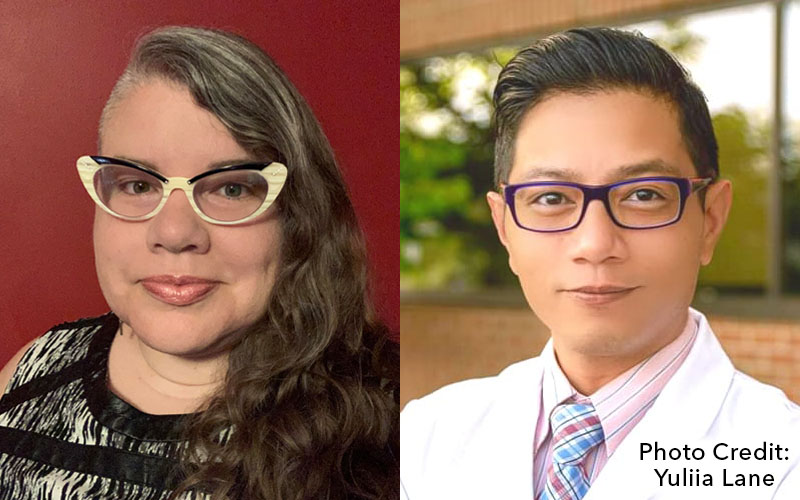Spectrum Club Offers Support and Welcoming Environment for LGBTQIA+ Students
After beginning college at age 16, including a semester at Harvard, Joseph Paul Javier lived with an aunt in the Philippines, where he enjoyed a 15-year career in radio, TV, public relations and journalism.
Severe nerve damage brought him back to the U.S. for a full year of treatment. During this time, Javier began taking online classes at Oakland Community College and earned an Associate Degree in Science.

Michelle Fether-Samtouni and Joseph Paul Javier
Looking for a way to make friends, Javier, who is an alumnus advisor for the Phi Theta Kappa honor society, joined what is now called the Spectrum Club eventually becoming president. He said it’s a safe space for students to discuss issues like coming out and making school more inclusive.
Javier, currently a doctor of pharmacy candidate at Wayne State University’s Eugene Applebaum College of Pharmacy and Health Sciences and serving on WSU’s Student Pharmacists Diversity Council, says Spectrum provided a welcoming atmosphere to make friends and meet other LGBTQI people at OCC.
OCC Sociology faculty member Michelle Fether-Samtouni, who has served as advisor of Spectrum for the past 10 years, helps students navigate the organization to make the club what they want it to be regardless of how they self-label. Behind the scenes, she also provides invaluable support for this population which, according to national studies, is more vulnerable to bullying, harassment, discrimination and interpersonal rejection.
“I am happy to help when students need assistance or support coming out, whether that is to family and friends or people who work at OCC,” she said. “For example, I have sent many emails to colleagues prior to a semester, letting them know a student wishes to go by a different name that is on the roster or asking them to be careful not to misgender the student.”
As the acronym that represents the queer community gets bigger, Fether-Samtouni also spends time helping both students and staff to understand, respect, and be inclusive of the various identities that fall under the LGBTQIA+ umbrella.
A fun, educational and safe place to hang out
In the past, Spectrum has hosted various social events such as going to Pride together, movies, games, trivia, karaoke, dances and various themed parties. It has also offered educational events including helping the OCC community learn about various queer identities; how to be an ally; safer sex; the history of the Gay Rights Movement; suicide awareness; a panel discussion on same sex marriage; and various community service projects. During some semesters where student leaders are too overwhelmed with classes/work/life to socialize, they have also hosted regular meetings so people have a safe place to make friends.
Fether-Samtouni says many students who met in Spectrum years ago are still close friends today.
“It is a great place to find support from people who understand when students experience rejection or challenges from family or friends after "coming out."
Other Support for OCC LGBTQIA+ Students
This year, OCC developed a "Chosen Name" option for students that supports trans and nonbinary students. This recognizes that students, faculty members and employees may use a first name other than their legal first name to identify themselves. Fether-Samtouni teaches about these topics in SOC 2560: Sociology of Sex Roles and SOC 2620: Sociology of Diversity. To learn more about chosen names watch this OCC video.
The Diversity, Equity, and Inclusion Committees also host training sessions for OCC employees and students.
For more resources on gender identity, check out The Trevor Project’s A Guide to Being an Ally to Transgender and Nonbinary Youth.
About OCC
Offering nearly 100 degrees and certificates, OCC is Michigan’s largest multi-campus community college and No. 1 transfer institution in the state. The College provides academic, career training and enriching experiences, designed to empower students to reach their potential and enhance our community. More than 1 million students have enrolled in the College since it opened in 1965. A seven-person Board of Trustees governs OCC. Board members are elected on a non-partisan, at-large basis, serve as volunteers and are not paid. Mission statement: OCC is committed to empowering our students to succeed and advancing our community. Learn more at oaklandcc.edu.
Media Contact: Marketing & Communications | (248) 341-2020 | contactus@oaklandcc.edu